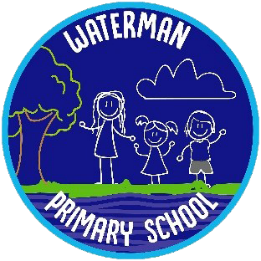T: 01268 546237
waterman.admin@heartsacademy.uk
Humanities
History
Curriculum Intent:
It is the aim of Waterman Primary and Nursery School that through our history curriculum, pupils will achieve a knowledge and understanding of the past. Both Britain’s and that of the wider world. We want to spark children’s curiosity and encourage them to develop their own lines of enquiry. We focus on gaining an appropriate vocabulary with which the pupils will be able to develop the tools to think critically, consider other people’s arguments and articulate their opinions. Children should leave Waterman being able to understand the diversity of societies and the relationships between groups of peoples in the past.
We have built our history curriculum on two main concepts which underpin all of the learning in this area:
• Cause and Effect - which allows children to develop a broader understanding of the forces that shaped people’s lives in the past
• Changes over Time - which allows children to explore the changes across different periods and societies.
We plan each lesson to involve an aspect of historical enquiry including: asking questions, observing, making inferences, using and analysing evidence and communicating historical information. During their time at the school, children study a range of significant events, people and periods of time. We have carefully chosen topics that give the children opportunities to make links to historical concepts and retain knowledge because they are linked to learning in other curriculum areas. The chosen topics allow pupils to explore positive historical influences and role models and understand the lessons that we can learn from more negative influences in history.
Implementation:
The history curriculum at Waterman is enquiry-based and is taught sequentially, building upon the children’s prior historical knowledge and understanding. We mirror the aims, skills, knowledge and understanding as set out in the National Curriculum. We expose children to a range of both primary and secondary sources and teach children to question and explain their validity.
We study a range of influential historical eras and some of the influential people from that time eg. Year ½ - Ernest Shackleton, Year 3/4 - Julius Caesar and Year 5/6 - Queen Victoria. We also examine the historical significance of time periods, events and individuals and compare and relate them to modernity using the 5Rs- (did it result in change? What did the event/individual reveal? How is it remembered? What it remarkable? and does it resonate today?).
We further our History curriculum through:
· Opening topics and some lessons with an enquiry-based lesson
- A strong emphasis on vocabulary (tier 3 subject-specific and technical vocabulary)
- Encouraging the use of ICT within and across lessons
- Educational off-site visits and in school visitors to develop and solidify classroom-based learning
- Exposing the children to artefacts and high-quality resources
- Using texts in English lessons which encourage cross curricular learning with history e.g Year 5/6 Street Child and Year 3/4 Escape from Pompeii
- Purposefully chosen topics that contain accessible and relatable links to our pupils’ lives
- History topics also provide the basis for other curriculum work in subjects like Art, DT and Geography
Assessing the children’s core knowledge after each unit through Kahoot quizzes
Please visit HEARTS Academy Trust Curriculum for our History curriculum.
Geography
Curriculum intent:
We aim to inspire in pupils at Waterman a sense of curiosity about the world and its people through the geography curriculum. We will endeavor to equip learners with knowledge about diverse people, places, resources, physical and human environments together with a sound understanding of the Earths key physical processes.
It is our intention that all children leaving Waterman Primary and Nursery School will be responsible global citizens with a secure knowledge of local, national and international geography, ready to positively contribute to society. We provide pupils with authentic accounts of lifestyles and traditions of different cultures, allowing them to compare people’s lives and develop respect for people and different cultures in varying locations around the world.
Prior knowledge is built upon in the curriculum by planning a unit of study in each key stage that studies a location across all the continents. The children’s study of the local area widens in each phase, from the school locality to the town then to the region then the country. Each topic in the curriculum looks at how the location affects the people that live there and how people have an impact on their local area and the wider environment. Pupils also gain knowledge about the changes that happen in places across time.
In geography lessons there is an aspect of geographical enquiry e.g observing, analysing, asking questions, observing, collecting, evaluating and communicating geographical information. Our children are challenged to use accurate geographical language which is appropriate to their age.
Implementation:
The aims, skills, knowledge and understanding as set out in the National Curriculum are mirrored in our curriculum. We teach lessons sequentially, building upon the children’s geographical knowledge and understanding about diverse places, people and resources (in both the human and natural world). This is done where possible through cross curricular lessons. In English, for example, children are exposed to texts which challenge and highlight the world’s social and environmental state (e.g. Year 5/6- The Boy at the Back of the Class).
We broaden the cultural awareness of the children by studying different cultures, traditions, climates and geographical similarities and differences. Each year, we plan fieldwork into at least one topic in the geography curriculum and each topic asks a specific question to which children find the answer through geographical enquiry.
We further our Geography curriculum by:
- Providing ample off-site educational visits (eg, fieldwork in local parks)
- A strong emphasis on vocabulary (tier 3 subject-specific and technical vocabulary)
- Creating and conducting our own geographical enquires (e.g. Year 5/6 visiting London and surveying commuters about the effect of pollution on the capital city)
- Exposing children to new experiences eg. As part of the HEARTS Promise children go to the beach and take the train in to London.
- Linking to wider areas of the curriculum, namely history, Science and English
Please visit HEARTS Academy Trust Curriculum for our Geography curriculum.
Address
Waterman Primary SchoolThe BoulevardRochfordSS4 1QF
Useful Links
Contact info
Mr D Wry
Executive Head Teacher
Mrs K Collison
Head of School
Mrs H Purcell
SENDCo & Senior Teacher
Enquiries:
Miss C Day
E: waterman.office@heartsacademy.uk
T: 01702 546237
For any swimming enquiries please email: watermanswimming@heartsacademy.uk
(Calls may be recorded for training and quality purposes)
Office hours
8.30am - 3.30pm
@HeartsTrust
@BriscoePrimary
@StambridgePri
@WatermanPrimary
@WickfordCofESch
@HilltopInfant
@HilltopJun
Website design by Kittle Visual Marketing









